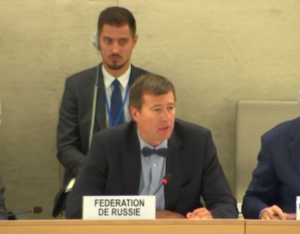Everyone has the right to free expression, and not to face discrimination because of their sexuality, including in Russia.
This was the message to the Russian Federation from the International Humanist and Ethical Union (IHEU) as part of the UN’s Universal Periodic Review (UPR) process for the state.

Russian Minister of Justice, Alexandr Konovalo, addresses the 39th session of the UN Human Rights Council
The IHEU called upon Russia to start taking seriously its own promises on non-discrimination and to respect the right to free expression of those who criticize the Orthodox Church or speak about LGBTI rights.
Speaking during the final stage of Russia’s review – at the 39th session of the UN Human Rights Council in Geneva – Alexandra Militz, on behalf of the IHEU, pointed out that Russia’s anti-extremism legislation remains the most serious threat to the rights of freedom of thought, conscience, belief and expression.
Notably, all UPR recommendations regarding Russia’s 2002 Anti-Extremism Legislation and associated Criminal Code articles, such as Article 282, were rejected or only partly adopted by Russia.
Under these laws, the definition of “extremism” is vague, and bloggers, journalists and critics of the government have been increasingly targeted. Russia’s Supreme Court estimated that convictions for ‘extremism’ more than tripled between 2012 and 2017.

One of the memes Maria Motuznaya has shared: “Russia suffers from two afflictions” (idiots and bad roads).
One recent case, highlighted by IHEU on the floor of the Council, is that of Maria Motuznaya. Ms Motuznaya is under police investigation after allegedly posting online several memes whic “mocked” the Russian state and the Orthodox Church.
The 23-year old tweeted about her story after investigators searched her apartment and confiscated her laptop and phone. She is accused of inciting hatred and insulting religious sentiments, while her name was added to an official list of “terrorists and extremists.” Charges against her include “hate speech and extremism,” for which she could face up to six years in prison.
The IHEU warned: “Motuznaya’s case is just another example of the Russian authorities’ willingness to uphold strict blasphemy laws.”
In its statement, the IHEU also raised the fact that members of the LGBTI community remain exposed to hate speech, discrimination and violence in russia. The Russia delegation claime that no discrimination occurs against LGBTI people in ts countries and that investigations no reported incidents of discrimination against LGBTI persons had occurred.
Despite pleas from many NGOs, Russia rejected several recommendations to repeal its Federal Law No. 135-FZ, under which “propaganda” of “non-traditional sexual relationships” is criminalized.
The IHEU urged the Russian Federation “to allow people to freely express who they are, whom they love, what they think and what they believe – even if that happens to go against the state’s understanding of “traditional values.””
In his closing remarks the attending Russian Minister of Justice, Alexandr Konovalov, argued that his country would not accept recommendations purely based on “emotions and political interests”.
In total, Russia accepted 191 out of the over 300 recommendations made by UN member states.
Russia is in its third cycle of the review process. The unique UPR mechanism of the United Nations Human Rights Council periodically examines the human rights performance of all 193 UN Member States. It aims to improve the human rights situation on the ground and to ensure the states commitment to their human rights obligations.
The IHEU statement follows in full below:
ORAL STATEMENT
International Humanist and Ethical UnionUN Human Rights Council, 39th Session (10th – 28th September 2018)
UPR: Russian FederationAlexandra Militz
Since its UPRs in 2013 and 2009 the Russian Federation has seen a significant worsening in violations of the right to freedom of thought, conscience and belief.
Against all recommendations in the past, the 2002 “Extremism Law” and associated Criminal Code articles remain the most serious threat to rights of freedom of belief and expression. In recent years, those sentenced, or facing prison terms or fines, for “extremist activities” have increasingly included bloggers, journalists and critics of the government.
One recent case was that of Maria Motuznaya, who is under police investigation after posting several memes mocking the Russian Orthodox Church and state. She is accused of inciting hatred and insulting religious sentiments, for which she could face up to six years in prison; her name was added to an official list of “terrorist and extremists.” Motuznaya’s case is just another example of the Russian authorities’ willingness to uphold strict blasphemy laws.
Meanwhile, members of the LGBTI community remain exposed to hate speech, discrimination and violence. Yet the Russian delegation reported “that there had been no incidents of discrimination against LGBTI persons.”
Notably, Russia rejected the recommended repeal of its Federal Law No. 135-FZ on the reasoning that: “In Russia, any form of restriction of the rights of citizens on the grounds of social, racial, sexual, national, linguistic, religious and any other belonging is prohibited.” Yet, this law criminalises “propaganda” of “non-traditional sexual relationships” and directly discriminates against people on the grounds of Sexual Orientation and Gender Identity. Further, the language of the law is deeply derogatory.
We call on Russia to start taking seriously its own promises on non-discrimination, and allow people to freely express who they are, whom they love, what they think and what they believe – even if that happens to go against the state’s understanding of “traditional values.”